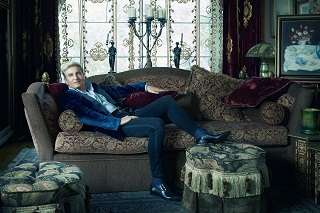|
Back
Devouring Debussy: Jean-Yves Thibaudet Performs Preludes for Palm Beach Palm Beach
Kravis Center for the Performing Arts
12/06/2021 -
Claude Debussy: Préludes, Books I and II
Jean-Yves Thibaudet (piano)

J.-Y. Thibaudet (© Andrew Eccles)
“Yes, we can!” yelled an irate spectator in reply to a loud voice barking, “Can you hear me?” out of another patron’s mobile phone as the world famous pianist Jean-Yves Thibaudet poured his heart out playing arguably the most achingly exquisite solo pieces in his instrument’s repertoire. People laughed at this momentary intrusion into their afternoon reverie on an uncharacteristically rainy South Florida day. Thibaudet continued to play unperturbed. But it was a nightmare scenario come to life for any performance of Claude Debussy’s Préludes. Not even the rudest interruption, however, could distract the listener from these evocative transports, delivered by the frenetic hands of a master.
Intending to do for music what impressionism had done for painting, Debussy, who did not use the term to describe his work, composed two full books of twelve short pieces each to transcribe sensations, memories, personalities, and perceptions into an emotive and intelligible musical lexicon using only the piano. Composed in two spurts of activity occurring between December 1909 and April 1913, they, like the earlier volumes of Proust’s Memory of Things Past, capture a nostalgic sensibility for a simpler world in the midst of a modernity hurtling toward destruction. In this sense they match his standalone Prélude à l’après-midi d’un faune, which is really more of a tone poem, following the poetry of Stéphane Mallarmé. Compositionally, the preludes also resemble Debussy’s earlier opera Pelléas et Mélisande, a symbolist romance that attempted to remove French music from the specter of Wagner, whose influence in France – and on Debussy – was profound.
Earlier composers, most memorably including Bach and Chopin, also created collections of preludes, but Debussy’s are far less academic and much more individualized in subject and inspiration. Debussy did not even intend for them to be performed altogether as a cycle, though their tonal similarities suggest a conceptual unity. He and others of his circle nevertheless tended to perform them in groups of three or four. Performing the preludes in their entirety, however, became a habit at the time each book was produced. It has also become a commonplace vehicle for virtuoso pianists looking to showcase their talent and a convenience for impresarios who want an easy way to program a two-hour concert divided evenly into two halves.
Thibaudet, a child prodigy who has been on the international scene for decades, certainly betrayed no reticence in displaying his talent. Flanked by roses donated in memory of the philanthropists Leonard and Sophie Davis, who sponsored the Kravis Center for the Performing Arts’s Regional Arts Classical Concert Series, and sporting a shiny black suit designed by Vivienne Westwood, he recalled a scaled-down version of Liberace and played with nearly as much flair. No one paid attention, but the program solemnly instructed us to remain seated under he had left the stage.
To maximize individuality of performance, Debussy placed the title of each prelude after the music. Indeed, each specimen is captured by a certain subjectivity that allows its subject to be guessed at. “Voiles,” the second prelude of Book I, suggests both veils and sails – in French they are the same word. Allusions to this bifurcated reference have been observed in the prelude’s ABA form. Other preludes are more precise. “Les sons et les parfums tournent dans l’air du soir” (“The sounds and fragrances swirl through the evening air”), for example, conveys its subject by being suitably dark and somber in tone. Still others communicate the composer’s personal experiences. “Les Collines d’Anacapri” (“The hills of Anacapri”) grasps at his sunny memories of vacationing on the southern Italian island of Capri. “Des pas sur la neige” (“Footsteps in the snow”) quotes the Russian composer Modest Mussorgsky, then familiar in France thanks to performances of his opera Boris Godunov by the touring Ballets Russes, to capture impressions of winter. Literary impressions also come across clearly. “Les fées sont d’exquises danseuses” (“The fairies are exquisite dancers”), which sparkles with accelerated tones, is taken directly from J. M. Barrie’s Peter Pan, a popular book then and now, which Debussy’s daughter received as a gift. “Hommage à S. Pickwick, Esq. P.P.M.P.C.,” an homage to the protagonist of Charles Dickens’s The Pickwick Papers, opens with a quotation of “God Save the King.”
Thibaudet, who played without a score, approached each prelude individually, but with an intensity that conveyed a very personal understanding. At times he embraced a warm sentimentality, particularly in the pieces that suggest nature. At other times, mainly in the preludes that suggest a definite subject, he projected a razor-sharp clarity that reveals flawless memory refracted through the prism of nostalgia. Greeted with enthusiasm by an audience that filled perhaps 40 percent of the hall, he encored with Sir Edward Elgar’s sweet Salut d’amour,” a welcome contrast that sweetened the concert’s overall impression.
Paul du Quenoy
|